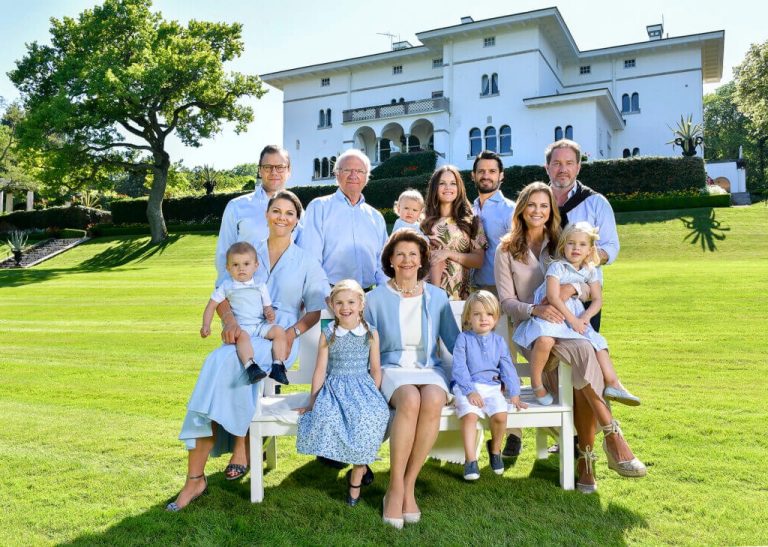Fortune Thomas Mulcair: The Evolution of his Political Career and its Impact in Canada
Fortune Thomas Mulcair
Thomas Mulcairborn on October 24, 1954 à Ottawais a important political figure in Canada. He headed the New Democratic Party (NDP) and has played a significant role in Canadian politics. In addition to being a lawyer by training, he holds dual Canadian citizenship.
Thomas Mulcair's political career with the New Democratic Party has left its mark on Canadian political history. Considered by many to be Layton's successor, his popularity extended as far as Quebec City, where his influence was remarkable.
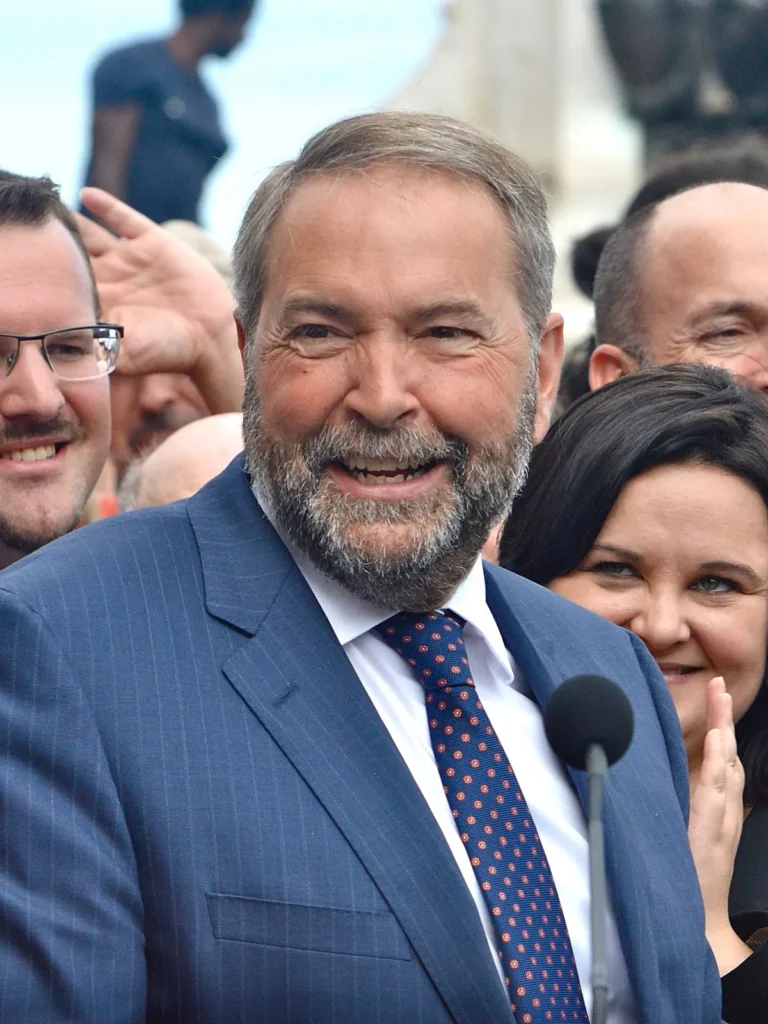
During his political career, Mulcair has proposed several important initiatives. For example, he proposed an investment of nearly five billion dollars to create 370,000 new childcare spaces. His riding of Outremont has become an important stronghold for him, helping to reinforce his position as one of Canada's leading politicians.
Thomas Mulcair's debut and education
Thomas Mulcair was born on October 24, 1954 in Ottawa, Ontario. Ontario. His education and early years laid the foundations for his future political career in Canada.
Youth in Quebec City
Thomas Joseph Mulcair was born at the Ottawa Hospital. He is the second child in a large family of ten, consisting of six boys and four girls. His parents, Harry Mulcair and Jeanne Hurtubise, raised their family in the Chomedey district of Laval, Quebec.
Mulcair's youth was spent in a large family environment, which probably helped shape his character and social skills. Growing up in such a large family undoubtedly prepared him for the challenges of public and political life.
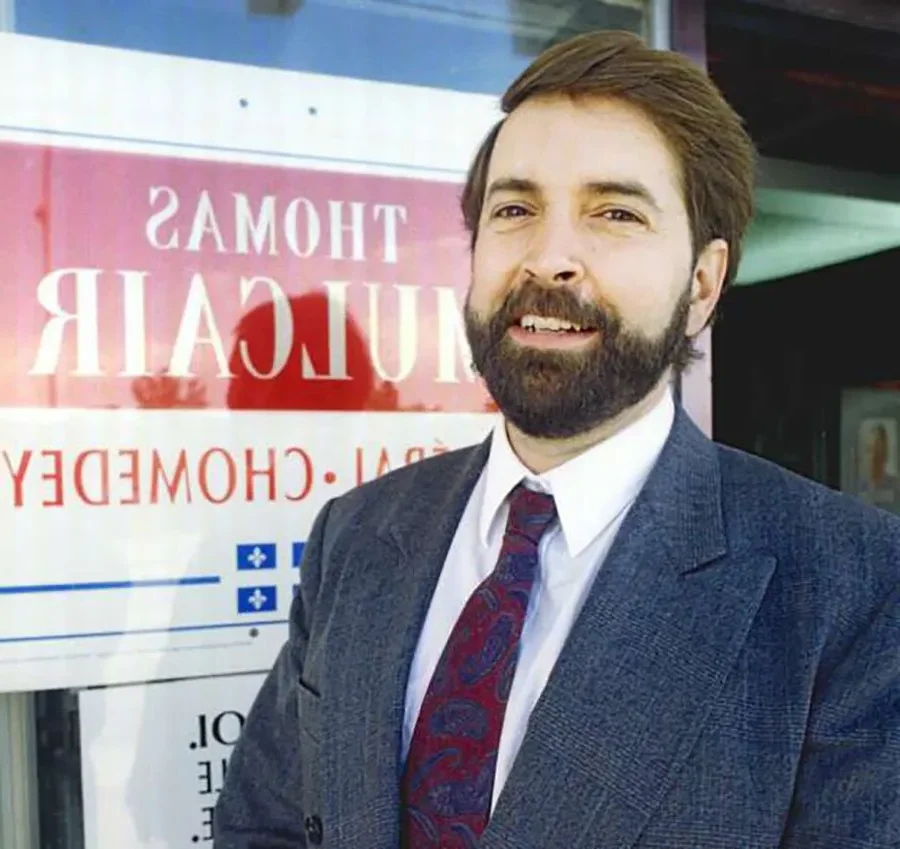
The Quebec context of his childhood also played an important role in shaping his identity and culture.
Academic Training
Thomas Mulcair's academic background is marked by a solid education. He first graduated fromcollege studies in social sciences at Vanier College at 1973laying the foundations of his career.
Mulcair then went on to study law at McGill University à Montréal. He obtained a bachelor of civil law (B.C.L.) in 1976followed by a bachelor of common law (LL.B.).
This dual legal training gave her a thorough understanding of both Canadian legal systems. This knowledge proved invaluable for her future political career in Quebec and at the federal level.
His rigorous academic training has developed his analytical skills and critical thinking.
Provincial Political Career
Thomas Mulcair began his political career at the provincial level in Quebec before moving on to the federal scene. His years in the National Assembly and his role as a cabinet minister forged his political experience.
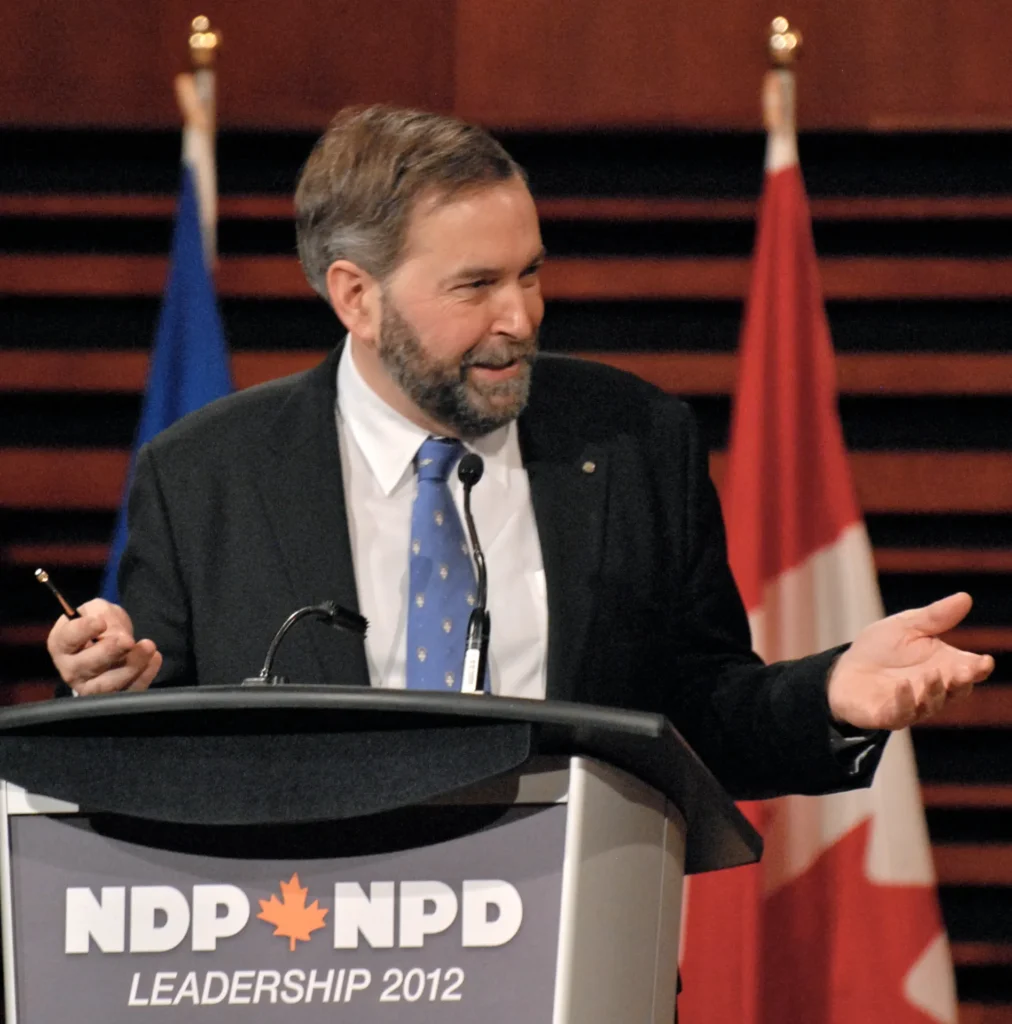
Quebec National Assembly
Thomas Mulcair made his entry into provincial politics by 1994 when he was elected Liberal MP for the riding of Chomedey à Laval. This victory marked the start of a provincial career that would span 13 years olduntil 2007.
During this period, Mulcair established himself as a strong voice within the Quebec Liberal Party. His training as a lawyer enabled him to stand out in legislative debates.
At the National Assembly, he held several important positions before joining the cabinet. His career in Québec City has been characterized by his direct approach and mastery of complex issues.
Charest Government Minister
Visit 2003Following the Liberals' victory in the provincial election, Jean Charest appointed Thomas Mulcair Quebec's Minister of the Environment. This position, which he held until 2006was one of the defining moments of his political career.
As Minister of the Environment, Mulcair introduced several important initiatives, including the strengthening of the province's environmental laws. His mandate was marked by his commitment to sustainable development.
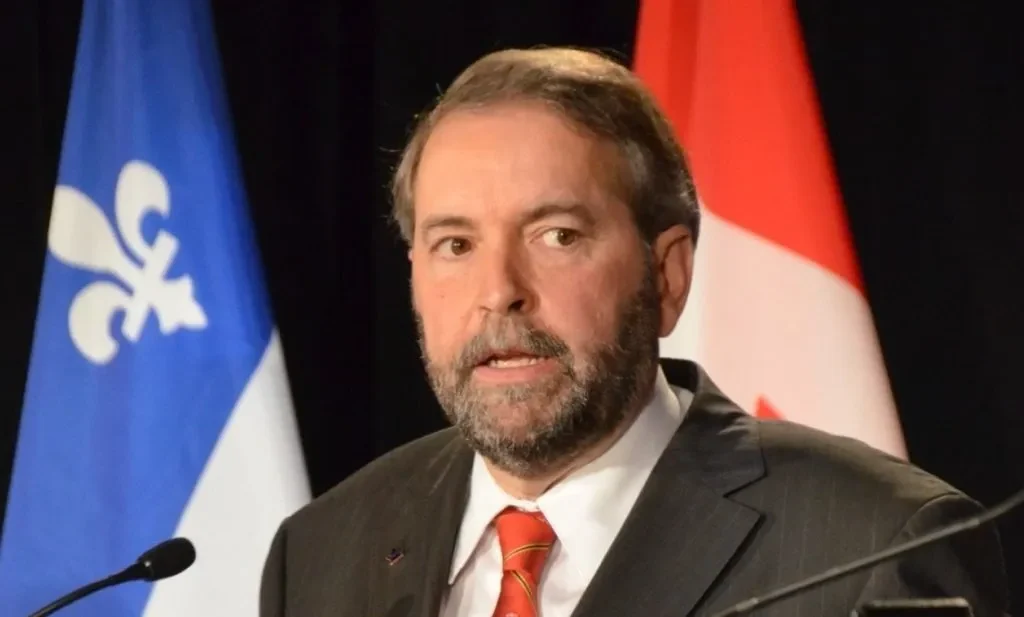
His resignation from the Charest cabinet in 2006 followed disagreements on environmental issues. This episode illustrated his commitment to his principles, even in the face of political pressure.
Transition to Federal Policy
After several years in Quebec provincial politics, Thomas Mulcair made the leap to the federal scene in 2007. This landmark change in his political career enabled him to extend his influence beyond Quebec.
Election as MNA for Outremont
Thomas Mulcair has become a pioneer for the New Democratic Party (NDP) in Quebec. In 2007, he won a by-election in the riding ofOutremont à Montréalbecoming the second NDP Member of Parliament ever elected in Quebec, after Phil Edmonston at 1990.
This victory was particularly significant as Outremont, a relatively affluent sector of Montreal, was not considered a traditional NDP stronghold. Mulcair was able to win over voters thanks to his established reputation as a former provincial cabinet minister.
His victory was confirmed in the general election of 2008consolidating its position in Canadian federal politics.

First steps in the House of Commons
In the House of Commons, Thomas Mulcair quickly distinguished himself through his debating skills and mastery of issues. Renowned for his direct and sometimes confrontational style, he became a prominent member of the opposition.
Jack Laytonthen leader of the NDP, appointed Mulcair Quebec lieutenant and finance critic. These responsibilities highlighted his political experience and in-depth knowledge of Quebec issues.
His speeches in the Chamber were often noted for their rigor and precision. His training as a lawyer enabled him to analyze bills in minute detail and effectively question the government on its policies.
New Democratic Party leadership
Thomas Mulcair left his mark on the history of the New Democratic Party (NDP) when he became party leader in March 2012succeeding Jack Layton. His mandate was characterized by efforts to maintain the party's gains in Quebec while developing a more centrist political platform.
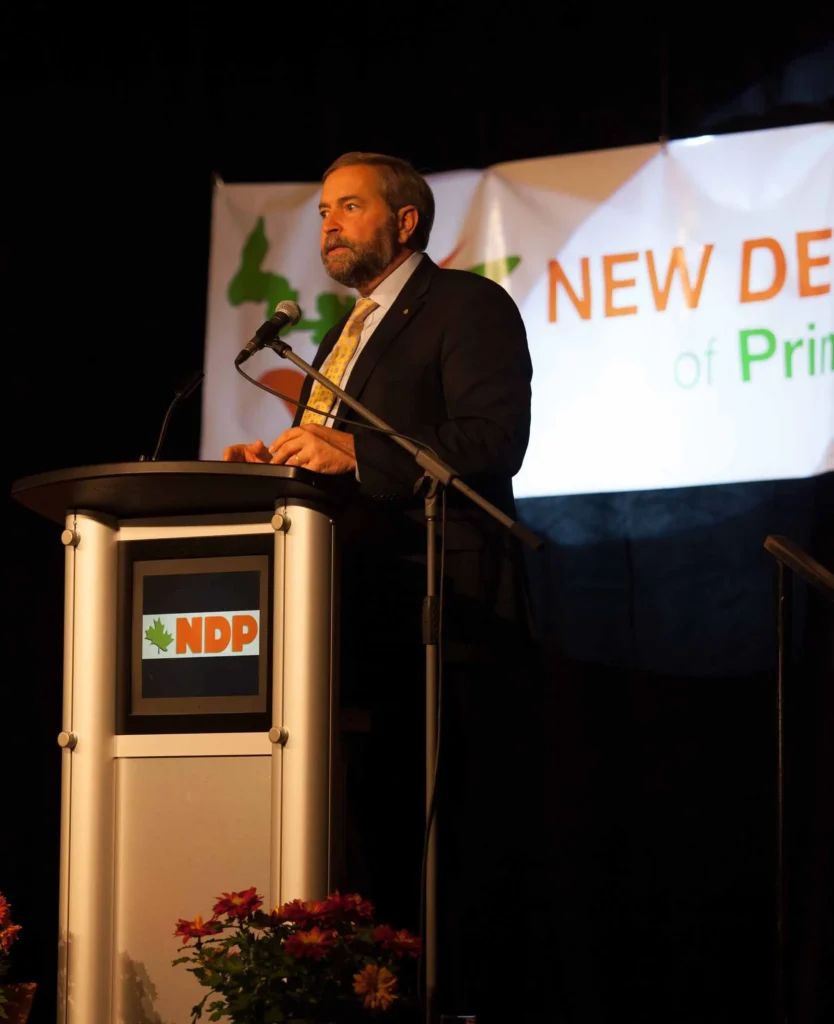
Jack Layton's succession
After Jack Layton's death in August 2011the NDP has begun a leadership race to choose a new leader. Visit March 24, 2012Thomas Mulcair won the race with 57,2% of the vote. His victory represented a crucial moment for the party, which had just achieved official opposition status thanks to the " orange wave "from 2011 in Quebec.
Mulcair, MP for Outremont and former provincial Liberal minister in Quebec, brought significant government experience to the table. His bilingualism and Quebec roots were seen as essential assets in maintaining the unprecedented support the NDP had won in Quebec.
Policy and Leadership Platform
Under Mulcair's leadership, the NDP adopted a more centrist approach to certain economic issues. He tried to present the party as a credible and responsible alternative government to Stephen Harper's Conservatives.
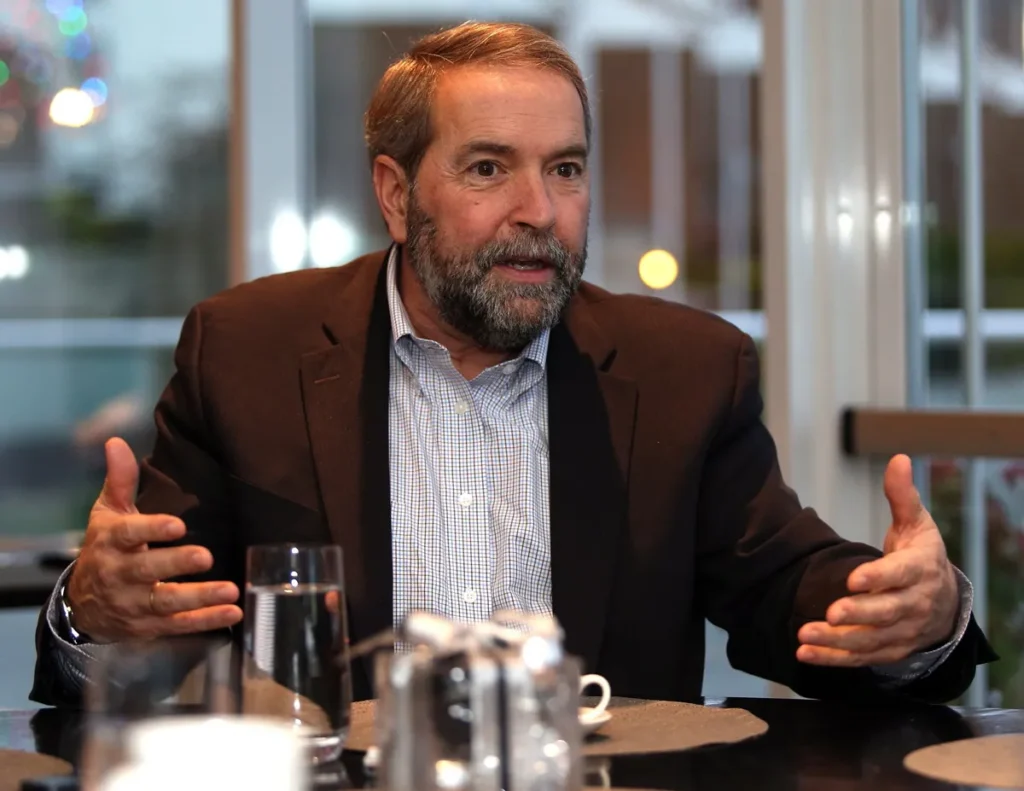
His main political positions included:
- Firm opposition to oil pipelines and commitment to environmental policies
- Support for the Canadian manufacturing economy
- The promise of a national daycare program
- Commitment to a balanced budget
Mulcair has earned a reputation as a formidable questioner in the House of Commons. His combative style and mastery of issues earned him the nickname "Grizzly" and reinforced his image as an effective opposition leader against the Harper government.
Internal Challenges and Contested Leadership
Despite a promising start, Mulcair faced major challenges. In the federal election of 2015the NDP went from 103 only 44 seatslosing its status as official opposition. This electoral defeat was partly attributed to the controversial promise to maintain a balanced budget, which allowed Justin Trudeau's Liberals to position themselves to the left of the NDP on certain economic issues.
In April 2016during a vote of confidence at the party congress in Edmontononly 48% of delegates supported his leadership. This result led to his resignation, although he agreed to stay on until a new leader was elected in October. 2017.
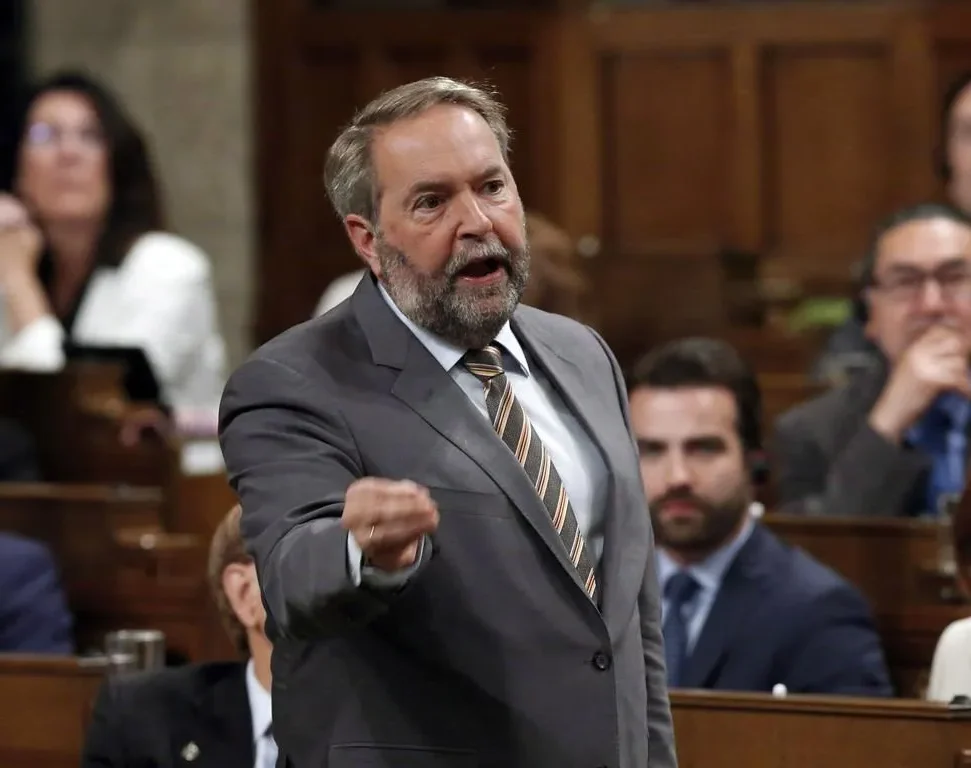
After leaving politics, Mulcair became a political commentator and teacher, while continuing to speak out on Canadian political issues.
The 2015 Electoral Campaign
The Canadian election campaign of 2015 proved historic and decisive for Thomas Mulcair and the New Democratic Party (NDP). This period marked a crucial turning point in Canadian politics, with distinct strategies, an unexpected Liberal surge and significant consequences.
Electoral strategy and promises
Thomas Mulcair's NDP approached the 2015 with a favorable position in the polls. Mulcair has adopted a cautious economic strategy, promising a balanced budget while maintaining social programs.
On taxation, he clearly stated that he would not raise taxes on the wealthiest, preferring to target large corporations. This position was intended to reassure centrist voters.
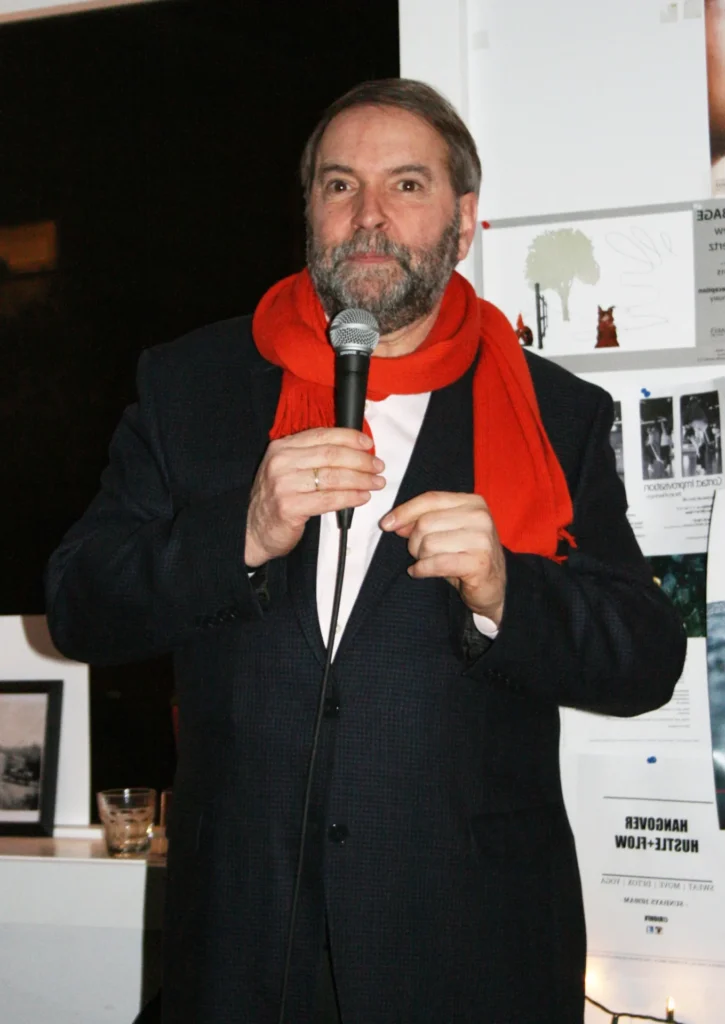
The NDP also emphasized:
- The creation of a national program of day-care centers at 15$ per day
- Abolition of the Senate
- Improving health care
The issue of the niqab during citizenship ceremonies has created controversy, particularly in Quebec, weakening the NDP's electoral base in that province.
The rise of Justin Trudeau
Justin Trudeau, initially underestimated, gradually gained in popularity during the election campaign. His proposal to invest in infrastructure and accept temporary budget deficits contrasted with Mulcair's caution.
The Liberal leader presented an image of change and optimism that appealed to many voters. His performance in the debates exceeded expectations, reinforcing his credibility against Mulcair and Harper.
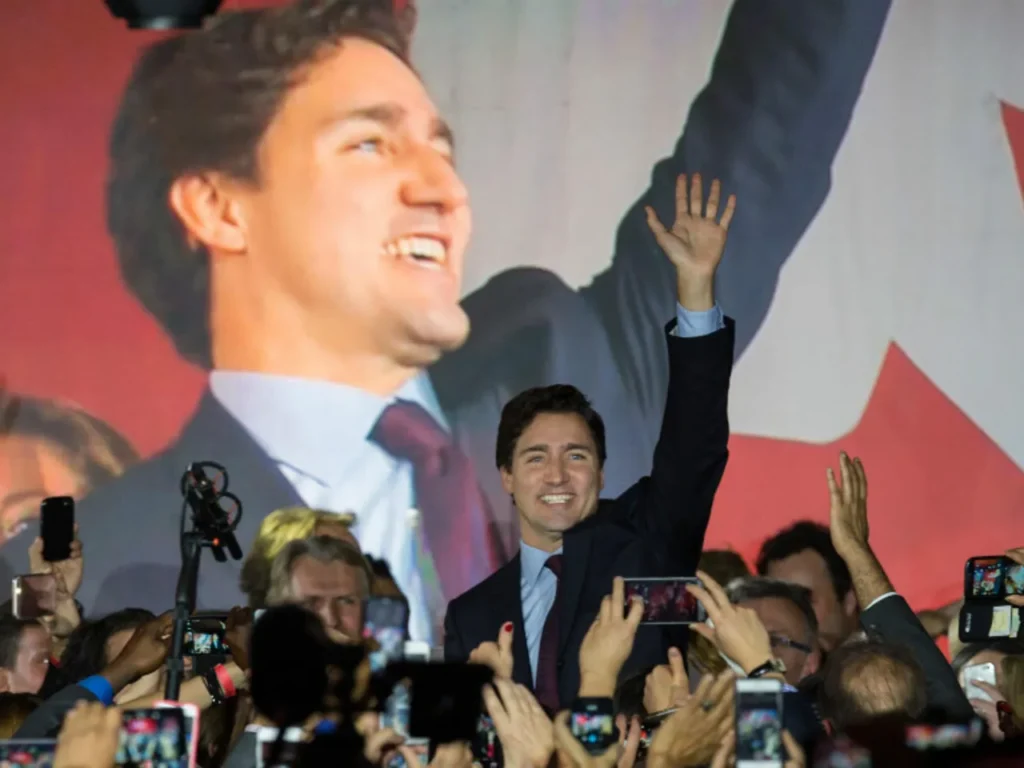
The Liberals also promised a more progressive tax reform than the NDP, including higher taxes for the wealthiest and cuts for the middle class. This position attracted progressive voters traditionally sympathetic to the NDP.
Results and Consequences for the NDP
Visit October 19, 2015the results were disastrous for the NDP. The party went from 103 seats to just 44, losing its status as official opposition. The Liberals of Justin Trudeau won a majority with 184 seats.
Thomas Mulcair acknowledged his responsibility for the defeat. " It's all on my shouldershe declared, admitting that his economic message had not convinced voters.
The NDP suffered particularly badly in Quebec, losing many seats to the Liberals and the Bloc Québécois. This defeat called into question Mulcair's leadership and the party's strategic direction.
Visit april 2016at a party convention, Mulcair obtained only 48% support. This triggered a succession process and marked the end of his role as leader of the NDP.
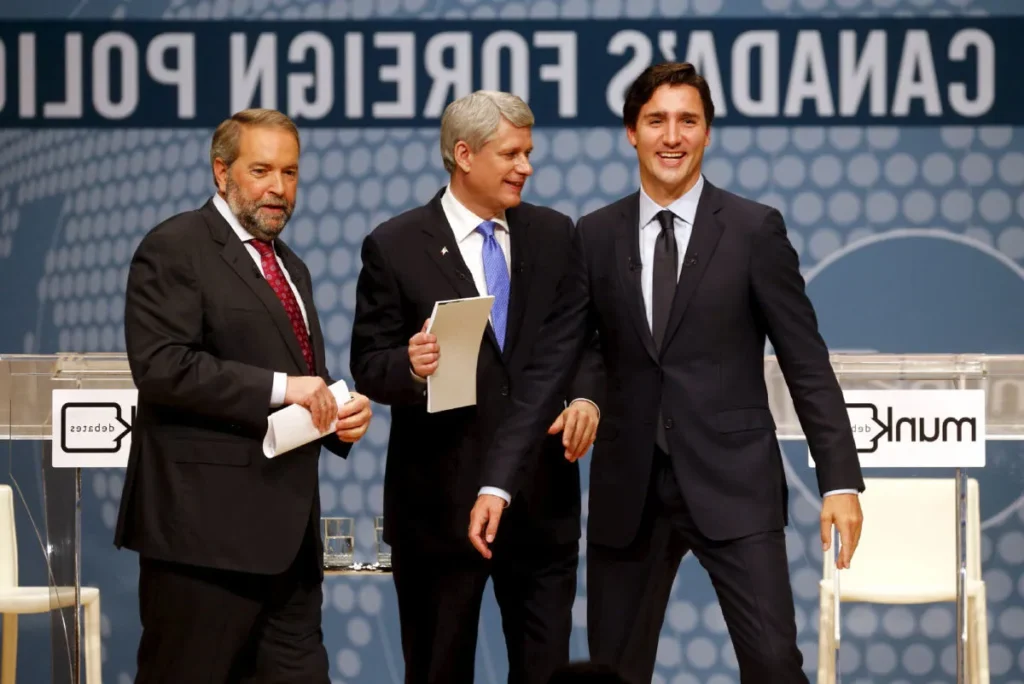
Economic and Environmental Issues
Thomas Mulcair left his mark on the Canadian political landscape with his strong positions on the economy and the environment. His approach often combined environmental protection with sustainable economic development.
Manufacturing and Industry in Hamilton
Hamilton, an industrial city in Ontario, was a focal point of Mulcair's economic policies. There, he vigorously defended Canada's manufacturing sector as essential to the national economy.
During his visits to HamiltonMulcair criticized government policies for neglecting the manufacturing sector in favor of natural resources. He felt that the over-exploitation of resources was creating a " Dutch disease "This was a time when the export of raw materials drove up the value of the Canadian dollar, undermining the competitiveness of manufactured products.
Mulcair proposed concrete measures to revitalize the sector, including tax credits for innovation and equipment modernization. He also called for a national industrial strategy to support well-paid manufacturing jobs.
Alberta Oil Sands Debate
Mulcair's position on Alberta's oil sands has provoked considerable controversy. As Quebec's former Minister of the Environment (2003–2006), he brought a unique perspective to the debate.
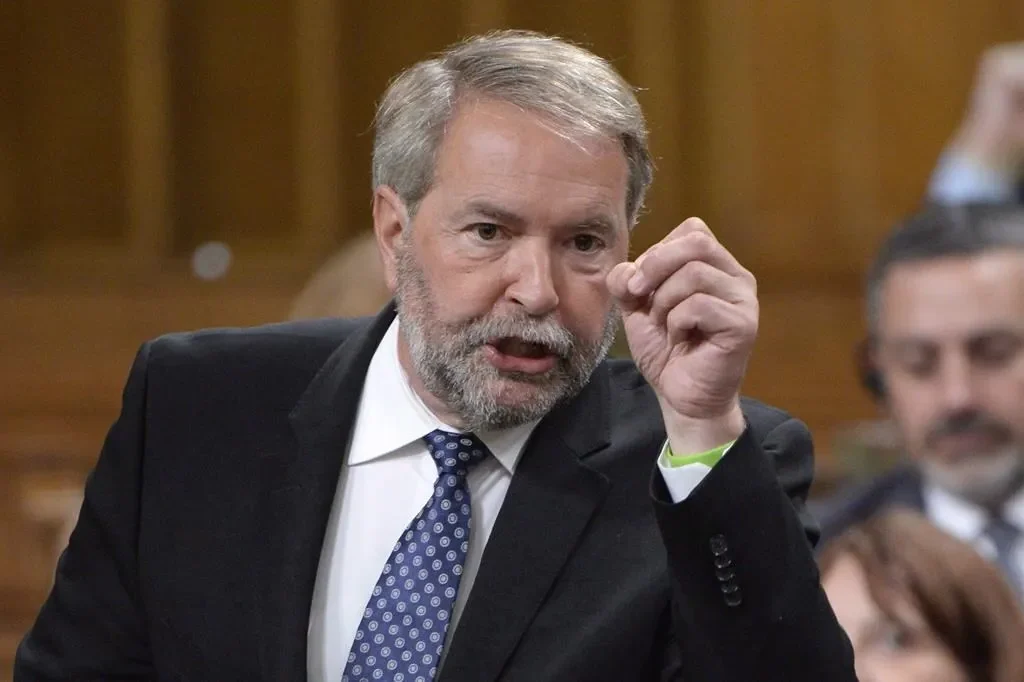
Mulcair argued that oil sands development should include real environmental costs. He claimed that the companies were benefiting from an implicit subsidy by not paying for the environmental damage caused by their activities.
This position earned him sharp criticism from the premiers of Western Canada, particularly Alberta. They accused him of dividing the country and jeopardizing thousands of jobs in the energy sector.
Economic policies under Mulcair
Mulcair's economic program was designed to balance growth and social responsibility. He defended the idea of sustainable economic development without sacrificing the environment.
During his NDP leadership, Mulcair advocated raising the federal minimum wage and strengthening social benefits. He also proposed a more progressive tax policy, with higher corporate taxes to fund social programs.
On the stage of parliamentary debates, Mulcair devoted many hours to the study of budgetary appropriations. This demonstrated his commitment to fiscal discipline. His training as a lawyer enabled him to analyze the economic implications of government policies with precision.
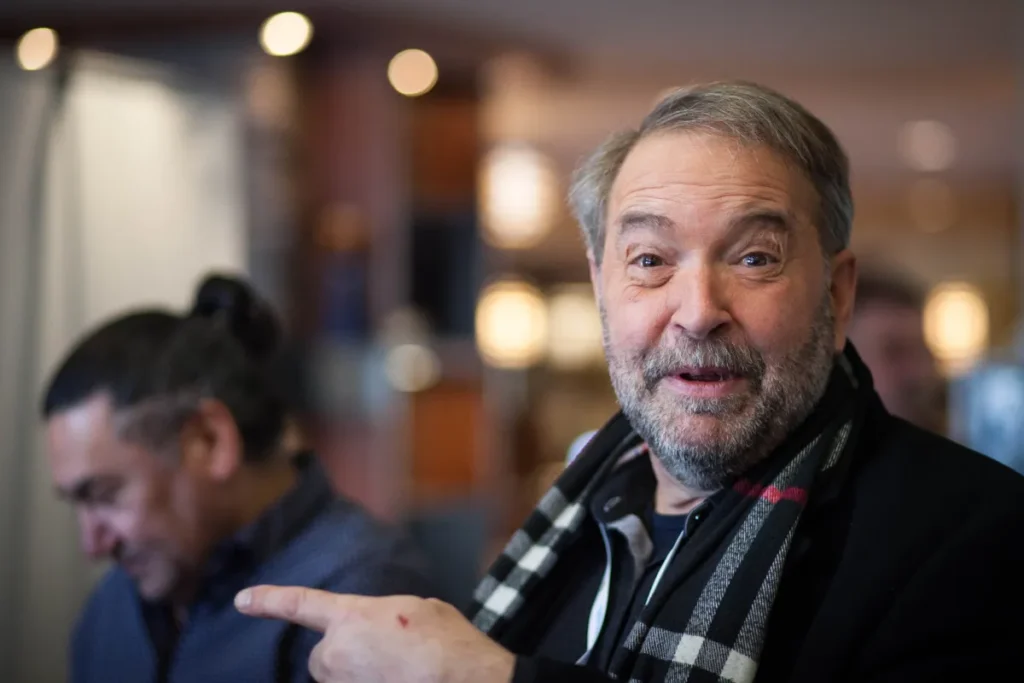
Outlook after the Policy
Following his departure from the federal political scene, Thomas Mulcair embarked on a new phase of his career, redirecting his expertise and influence towards other spheres of Canadian public life.
Post-political activities
Thomas Mulcair has become an influential political commentator in the Quebec media. According to research results, he joined the Journal de Montréal as a political columnist, a role he was still fulfilling in March. 2025. His chronicle of March 14, 2025 entitled " Legault cuts, patients suffer "demonstrates that he continues to tackle topical issues with a critical eye.
This media comeback is all the more remarkable in that it comes after his move to the New Democratic Party (NDP), a party he had joined in 2007 after being courted by the Green Party and the Conservative Party.
Mulcair has also spoken at conferences on various Canadian political issues, including climate change and urban policy.
Heritage and Continuous Influence
Thomas Mulcair's influence remains significant in the Canadian political landscape, particularly in Quebec. His switch from the Quebec Liberal Party to the NDP marked a turning point in his political career and helped redefine the NDP's place in Quebec.

His expertise on environmental and social issues continues to fuel public debate. His vision for improving the Canada Pension Plan and combating climate change remains relevant to current political discussions.
His ability to navigate between different political formations and his in-depth knowledge of economic and social issues make him a respected voice in government policy analysis, as evidenced by his comments on federal budgets.
Relations with other political parties
Thomas Mulcair has navigated the Canadian political landscape through complex relationships with other parties. His interactions have been marked by periods of tension and strategic cooperation, shaping his political image over time.
Rivalry with the Conservative Party
The relationship between Thomas Mulcair and the Conservative Party, particularly under Stephen Harperwas characterized by firm opposition. As leader of the NDP, Mulcair positioned himself as the progressive alternative to conservative policies.
During parliamentary debates, he regularly confronted Harper on environmental and economic issues. His precise questioning technique earned him the nickname of "The Man of the Hour". attorney "in the House of Commons.
The NDP under Mulcair has been a vocal critic of Conservative energy policies, notably the expansion of the tar sands and the weakening of environmental protections. This opposition reinforced the NDP's profile as a defender of progressive values.
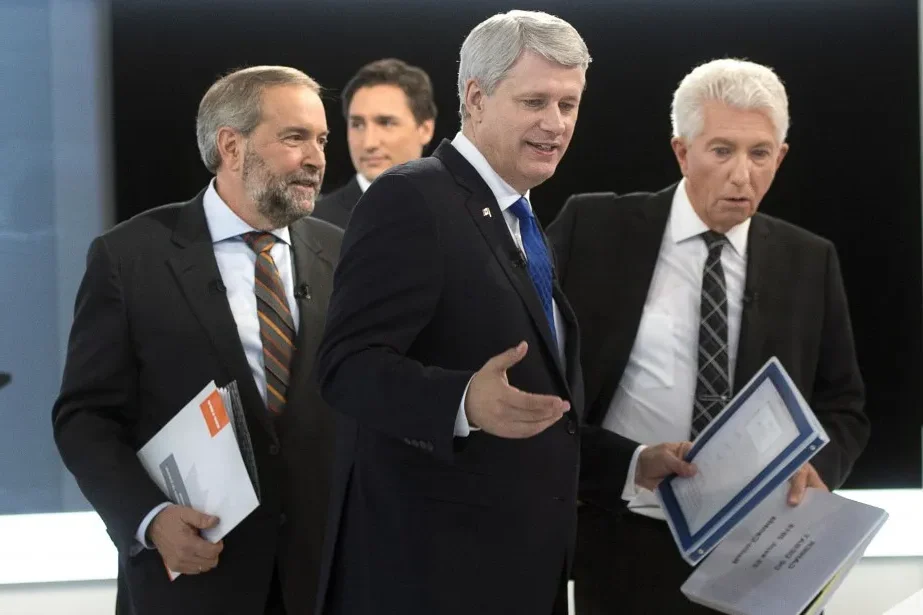
Dynamics with the Liberal Party of Canada
Before joining the NDP, Mulcair had ties with the Liberal Party. He had discussions with the federal Liberals before choosing the NDP, creating a complex history between him and that party.
When Justin Trudeau has become Liberal leader at 2013the dynamic changed. The more experienced Mulcair first tried to portray Trudeau as lacking political substance.
During the 2015competition intensified when the Liberals overtook the NDP in the polls. Trudeau's promise to accept budget deficits contrasted with Mulcair's commitment to a balanced budget, a position that surprised many traditional NDP supporters.
Summary
Thomas Mulcair, a key figure in Canadian politics, has had a career marked by both provincial and federal involvement. A former environment minister in Quebec, he became leader of the New Democratic Party (NDP) in 2012, succeeding Jack Layton. Under his leadership, the NDP reached new heights, although the 2015 election marked a setback. A lawyer by training, Mulcair is known for his rigor, eloquence and environmental advocacy. Since retiring from politics, he has become an influential columnist. His fortune of close to 5 million Canadian dollars derives mainly from his years in politics, his conferences and his media publications.
Frequently asked questions
Thomas Mulcair had a political career and an interesting personal life that often raise questions. His transition from Quebec provincial politics to the Canadian federal scene and his current activities are particularly noteworthy.
Who is Catherine Pinhas, Thomas Mulcair's spouse?
Catherine Pinhas is a psychologist by profession and Thomas Mulcair's wife of several decades. She is of French origin and Jewish, which influenced Mulcair's conversion to Judaism.
The couple have two children together and have maintained a discreet presence during Mulcair's political career.
What were Thomas Mulcair's previous positions?
Thomas Mulcair was a lawyer specializing in environmental law before entering politics. He was Minister of the Environment in Jean Charest's Liberal government in Quebec from 2003 to 2006.
Before becoming leader of the NDP, he was federal MP for Outremont from 2007. He also served as Jack Layton's Quebec lieutenant in the NDP.
He was Leader of Canada's Official Opposition between 2012 and 2015.
What is the content of Thomas Mulcair's columns in the Journal de Montréal?
Thomas Mulcair writes regular political columns for the Journal de Montréal, analyzing current political events in Canada and Quebec. He often comments on Canada-U.S. relations and environmental policies.
In his writings, he mentioned the ties between the Trump family and Canada.
How did Thomas Mulcair succeed Jack Layton?
Following Jack Layton's death in August 2011, Thomas Mulcair ran for the leadership of the NDP. He was elected party leader in March 2012 at a leadership convention.
His victory came on the fourth ballot, when he won 57.2% of the vote against Brian Topp. Mulcair had the tough task of maintaining the "orange wave" that Layton had created in Quebec during the 2011 election.
What are Thomas Mulcair's current activities?
Since retiring from active politics, Thomas Mulcair has worked as a political analyst for several Canadian media. He is a regular columnist for the Journal de Montréal and a television commentator.
He also teaches as a visiting professor at Canadian universities, sharing his expertise in environmental policy and law.
Mulcair continues to speak out on environmental and political issues, maintaining a presence in Canadian public debate.
What religious beliefs has Thomas Mulcair mentioned publicly?
Thomas Mulcair, born into a Catholic family, converted to Judaism after meeting his wife Catherine Pinhas. He has spoken openly about his conversion and the importance of his faith in his personal life.
Throughout his political career, he has generally maintained a low-key approach to his religious beliefs. He has also respected Canada's religious diversity.
He represents a rare case of a high-profile Canadian politician who has embraced the Jewish faith.


